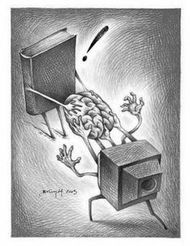|
by Kaitlyn Gaffney
I am an unabashed fantasy nerd. I was raised on Harry Potter, YA vampire novels, Brandon Sanderson, and Dungeons & Dragons. I still play World of Warcraft and I world-build for fun, but my entire life, I have heard fantasy--and genre fiction in general--referred to as a “guilty pleasure.” With the explosion of YA and genre fiction in the past decade or so, the literary world has seen many arguments for the distinction between genre fiction and literary fiction and, in many cases, for literary fiction’s superiority. Arthur Krystal, in his piece “Easy Writers” for The New Yorker, promotes this hierarchy on the basis of genre fiction’s disproportionate focus on archetypal plot and inherent escapism. He describes genre fiction as “a narrative cocktail that helps us temporarily forget the narratives of our own humdrum lives.” I read this article a few months ago and felt the familiar sting of shame for my love of fantasy fiction.
1 Comment
 image credit: Pinterest image credit: Pinterest by Nicolina Givin I sat on my couch on the fourth of October and flipped through the channels on my television. I caught a glimpse of Emily Blunt grabbing a blonde by the back of her head and dragging her onto the floor. The title, The Girl on the Train, flashed at the end and I was in bewilderment. “That’s a movie now?” I thought to myself. The movie was released to theaters on the eighth. I picked up the novel, which had been sitting on my bookshelf for some time, and opened the cover, ready to finally read what everyone was about to see on the big screen. I could not have the world tell me the plot and ending before I could figure it out myself; I had to finish it before the movie release. Why was I motivated soon after that preview to read the book rather than when I first purchased that book eight months prior? The answer was always sitting there on my bookshelf, but the media pushed me towards it and spoke clearer to me in that thirty-second preview. by Amanda Rennie The world is dark, dismal, messy; there is a teenager who is, believably, old enough, clever enough, mature enough, independent enough to make life-altering decisions. 16 or 17 is a good age because then they can rebel against adults, not go to school, and have an intense and passionate relationship. This teenager isn't like all the other teenagers. This teenager can make a difference. Yawn. It started with the vampire craze, but the publishers of young adult fiction have fully submersed themselves in Dystopia: everywhere and everything is terrible, and only one young person has the ability to change it and make the world a better place. Young adult authors, lots of them, have been churning out trilogies (ALWAYS trilogies) with the same stock characters and fabled ending for years now. And guess what? It's only becoming more generic.
|
Archives
July 2024
Categories
All
|
|
Glassworks is a publication of Rowan University's Master of Arts in Writing 260 Victoria Street • Glassboro, New Jersey 08028 [email protected] |
All Content on this Site (c) 2024 Glassworks
|


 RSS Feed
RSS Feed
